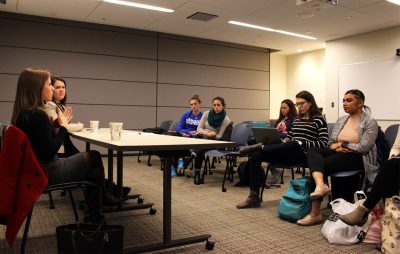
The Boston University Diversity in Law Association hosted a student town hall at the Yawkey Center for Student Services, focusing on women’s advancement and gender equality in the workplace.
MaryRose Mazzola, executive director of the Mayor’s Office of Women’s Advancement, and Megan Costello, executive director of the Boston Women’s Workforce Council, spoke about their work and answered audience questions about changes that need to take place in offices.
Anima Anwar and Raina Hasan, both juniors in Boston University’s College of Arts and Sciences and co-presidents of BUDLA organized the town hall to provide a place for students to ask questions and voice concerns.
“We’ve always felt there needs to be more diversity in the legal field as well as in government,” Anwar said before the town hall. “Especially for issues like wage equality and just things of that nature. So we thought that it would be the best thing to bring it to the campus. Especially at a campus that’s generally progressive, we feel it would have gotten a lot of support.”
During the discussion, Costello highlighted the need for businesses and the government to think outside the box.
“How can government go beyond policy and legislation?” Costello asked. “So much of this is not necessarily about legislation and policy, but it’s much more about social norms and culture.”
Massachusetts is one of five states that has passed equal pay legislation, Costello said, and she attributes the success of women’s rights in Boston to the mayor’s personal efforts to improve the city.
“Mayor [Martin] Walsh is the only mayor in the country and Boston is the only city in the country that has taken such a unique approach to how we are addressing the gender wage gap,” Costello said. “I’m very proud of the work that we’ve done.”
Mazzola outlined the work they do involving the “100 percent Talent Compact” for local businesses. The compact asks employers to submit anonymous data about the gender, race and pay of their employees.
“To this date, and when you hear most reports of the wage gap, it’s based on census data, which is employee-provided,” Costello said. “That’s inconsistent and unreliable for a number of reasons.”
After receiving this data, the council finds solutions to help companies decrease gender and wage gaps.
“We want to work with employers to have them implement best practices,” Mazzola said.
Several students who attended the town hall expressed their passion for women’s equality.
Sara Luster, a sophomore at Hamilton College, said she came because women’s rights in the workforce is an issue she’s passionate about.
“I feel like it’s always interesting to see women who have really advanced in the workplace and [are] making steps to make a difference,” Luster said.
Kiva Leibowitz, 28, of Chelsea, said she attended because this is an issue she and her friends frequently talk about.
“[I] just had to negotiate a job so definitely it’s interesting being here listening to everything everybody says, and just talking with girlfriends about jobs and everything,” Leibowitz said. “It is important to make sure we’re getting compensated properly.”
Jacqueline Rocheleau, a CAS junior, said she came to learn more about an issue that affects her personally.
“It’s a huge issue that has a very serious impact on society,” Rocheleau said. “Much like they were talking about, it very negatively affects where we can go as a society, as a country, as a global population.”



















































































































